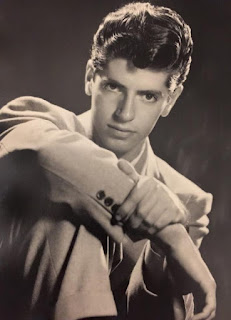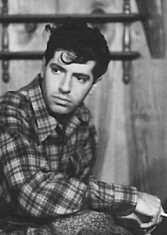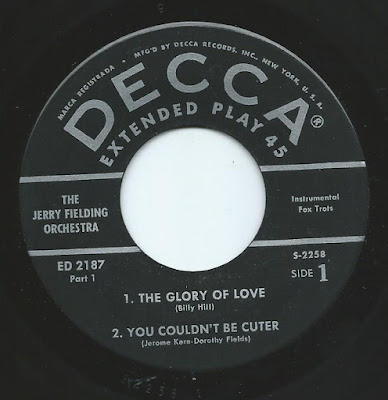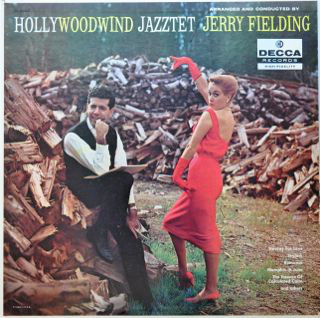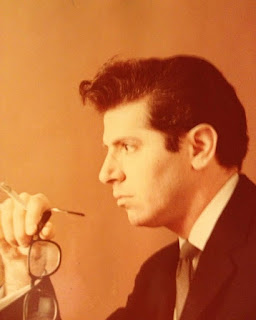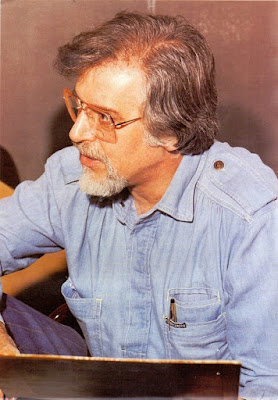Jerry Fielding (June 17, 1922 – February 17, 1980) was an American jazz musician, arranger and band leader who emerged in the 1960s to create boldly diverse and evocative Oscar-nominated scores, primarily films in western and crime action genres.
Fielding was born in Pittsburgh as Joshua Itzhak Feldman to the Russian immigrants Hiram Harris and Esther Feldman As a child he studied trombone, clarinet, sax, and piano. He joined his school band. Given a music scholarship for gifted instrumentalists, he attended the Carnegie Institute for short time, before an illness forced him to be bedridden for two years. Recovering from his illness he took a job working in the pit band at Pittsburgh’s Stanley Theater. He studied composition and arranging with the Stanley’s conductor Max Adkins. Adkins also taught Henry Mancini and Billy Strayhorn. Under Adkins guidance Jerry wrote arrangements for the Stanley Theater band. Adkins introduced Jerry to guitarist/swing band leader Alvino Ray.
At the age of 17 Jerry left Pittsburgh for Los Angeles to join Rey’s band as an arranger. His arrangement of Picnic in Purgatory in 1940 became a popular song. When Alvino Rays band was drafted in the army, Jerry found work with the Kay Kyser’s band, becoming the chief arranger in 1945. He went on to arrange for the big bands of Claude Thornhill, Jimmie Lunceford, Tommy Dorsey, Charlie Barnet, and Les Brown. Fielding also wrote extensively for radio, including programs hosted by Hoagy Carmichael, Kate Smith, and the Andrews Sisters, and was eventually named musical director of The Jack Paar Show. Fielding is forced to change his name (what was considered “too Jewish”) so that he could continue working on live radio. He changes it from Feldman to Fielding.
By 1952 Fielding helmed his own jazz orchestra, which was the house band on Groucho Marx's popular television game show You Bet Your Life, but as a self-confessed "loudmouthed crusader" who received death threats for hiring African-American musicians, it was inevitable that he would run afoul of Senator Joseph McCarthy's anti-Communist witch hunts. Called to testify in front of the House Un-American Activities Committee, Fielding took the Fifth Amendment, refusing to divulge the names of any colleagues who might be suspected of "Communism", doing so knowing that pleading the Fifth would damage his thriving radio and television career, as it did. He was blacklisted by the national television and radio networks, who were being pressed by these same forces with a similar fate if they 'failed to cooperate."
Fielding sought refuge in Las Vegas, where he served as musical director for acts including Abbott & Costello and Debbie Reynolds. In Nevada he led a band at the Royal Las Vegas Hotel. He also toured for the only time with his name orchestra, which also released several albums during this period, first for a little-known independent label, with Jerry Fielding Plays a Dance Concert (Trend, 1954), followed by Sweet with a Beat (1955), Fielding's Formula (1957), and Hollywoodwind Jazztet (1958), all on Decca.
Later LPs including Magnificence in Brass and Near East Brass remain favourites of exotica collectors. His jazz and pop background allowed him to survive while the blacklist destroyed the concert and film-based careers of musicians such as Schoenberg champion and film composer Louis Gruenberg and the first black Broadway and film star, Paul Robeson.
With McCarthy's reign of terror finally at an end, Fielding returned to Hollywood in 1962, and at the recommendation of blacklisted screenwriter Dalton Trumbo he was hired to write his first feature score for Otto Preminger's political thriller Advise and Consent. A score rich in atmosphere and melancholy -- two emerging signatures of Fielding's work -- it was followed by a series of light-hearted television efforts including themes for the series Hogan's Heroes and Run Buddy Run. He also worked on soundtracks for the TV shows Star Trek, He & She, The Good Guys, McMillan and Wife, and The Snoop Sisters.
In 1966, he teamed with two-fisted filmmaker Sam Peckinpah for the tele-film Noon Wine, inaugurating an often-contentious creative partnership that won Fielding Academy Award nominations for 1969's The Wild Bunch and 1971's Straw Dogs. While working in Hollywood in the 1970s Fielding studied 20th century composition techniques with veteran composer Mario Castelnuovo-Tedesco at USC. Tedesco also provided instruction to John Williams, Henry Mancini, Andre Previn and Nelson Riddle.
Clint Eastwood was well served by Fielding's scores to The Enforcer (1976) and The Gauntlet (1977). The composer responded to their hard-edged urban milieu with full-on jazz compositions that featured some of the best jazz players in the business. In 1976 Fielding received his third and final Oscar nomination for Eastwood's The Outlaw Josey Wales (1976).
From the mid-'70s onwards, the composer endured a series of heart attacks resulting in a fatal heart seizure on February 17, 1980 while in Canada scoring the now virtually unknown motion picture Funeral Home. He was 57 years old. He posthumously wins an EMMY for the tv-movie “High Midnight.”
(Edited from AllMusic, IMDb & Wikipedia)

